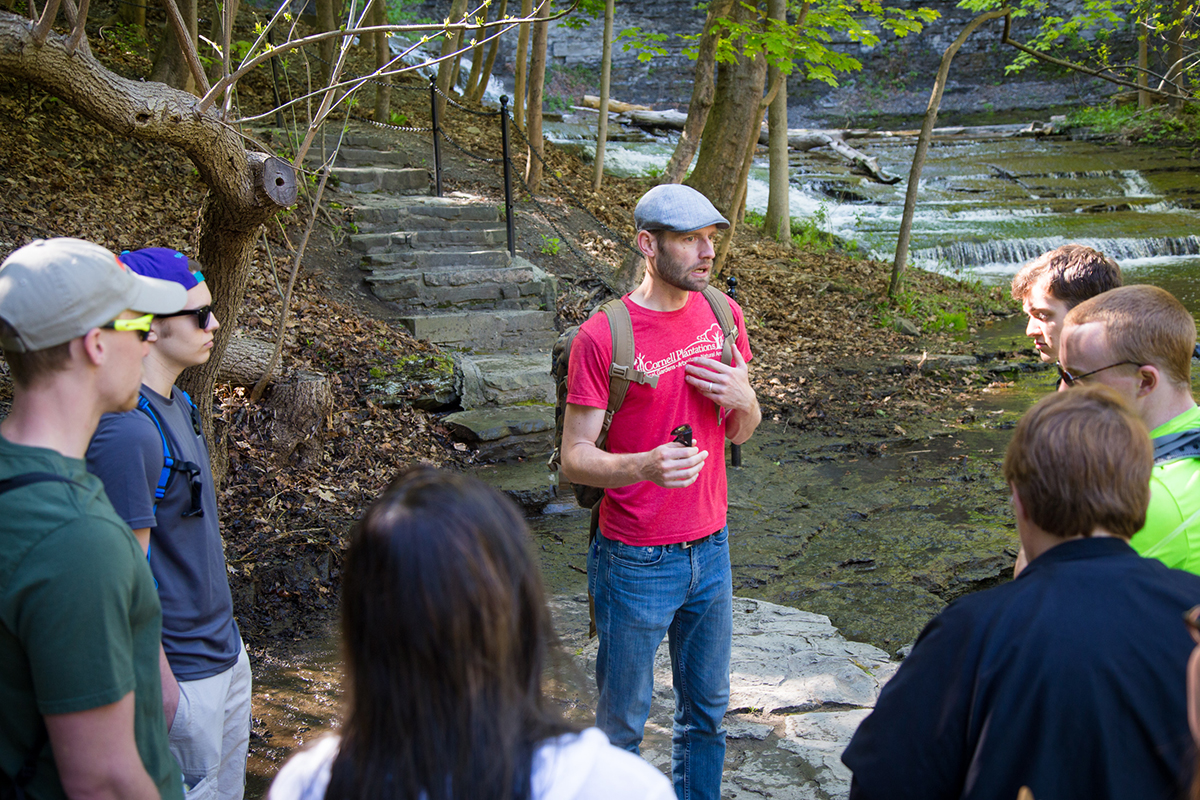City, university gorge stewards train for summer patrols
By Nancy Doolittle

In addition to enjoying hikes in Ithaca’s gorges, there is one indispensable requirement for Cornell gorge stewards and city of Ithaca gorge rangers, says Mike Roberts, Cornell Plantations’ natural areas steward: the ability to make good decisions.
Cornell and the city of Ithaca partnered in gorge safety training May 20 and 21, when four stewards and three rangers, including city forester Jeanne Grace, met Roberts for tours through Cascadilla and Fall Creek gorges and Beebe Lake. The tours helped them become more familiar with some of the public’s favorite natural spots – and the hazards they pose – and learn how to interact with trail users regarding gorge safety.
Roberts used natural gorge features to illustrate the difference between situations that do not require intervention, situations in which a gentle teaching about such potential hazards as slippery rocks or falling debris might be appropriate, and situations – such as swimming – which are prohibited in all areas in the gorges and require careful intervention. Stewards and rangers also received a half day of CPR and first aid training as well as training by Cornell Police crime prevention officer Lisa Van Horn on communication skills that will de-escalate potentially unsafe situations.
It is not the job of those patrolling the gorges to enforce policy, said Roberts; rather, they are there to educate the public on all aspects of the gorges – geology, biology, natural history and preservation – as well as the hazards in the gorges and safer options for cooling off in the summer.
Where to swim
There is no authorized outdoor swimming at Cornell University, but three state parks – Buttermilk Falls, Robert H. Treman and Taughannock Falls – have designated swimming areas.
Two public Ithaca pools also help residents stay cool in the summer: the Alex Haley Municipal Pool, 408 N. Albany St., which will open in early June (call 607-272-3622 in advance), and Cass Park Pool, 701 Taughannock Blvd. (Route 89), which will open June 18.
The stewards started patrolling May 21 and will lead public tours of the gorges each Saturday and Sunday through August.
“It is a balancing act between encouraging the use of an area but also curtailing other uses to make sure that everyone remains safe,” Roberts said. “Yes, you need to inform the public of safety precautions, but you also need to know when not to interfere.”
For instance, he said, though swimming is not allowed, if you see a mother and young child dabbling their feet in shallow water, they probably only need reminding that the rocks might be slippery or there might be sharp hazards to watch for. But if a steward sees someone swimming in pools of water or departing from designated trails and recreation spaces, that person should be told the Cornell University or Ithaca police will issue a ticket with a fine if they see that activity. Stewards and rangers should also inform that person of other options for swimming that are legal and safe, such as Buttermilk Falls.
Those patrolling natural areas must use careful judgment if they encounter groups of people using alcohol or drugs, leaving it up to the police to intervene, Roberts said, adding city stewards patrolling Six Mile Creek have special challenges and need to be acutely aware of their surroundings.
Cornell’s gorge stewards are an integral part of the Nathaniel Rand ’12 Memorial Gorge Safety Education Program, serving as ambassadors to inform visitors of ways to safely appreciate the gorges. According to Grace, the city rangers can benefit from Cornell’s gorge steward training because they employ similar tactics for diffusing potentially dangerous situations. Though their jurisdictions may differ, city rangers and university stewards have the same goal in mind: to keep the summer safe for all who enjoy Ithaca’s natural beauty.
Media Contact
Get Cornell news delivered right to your inbox.
Subscribe